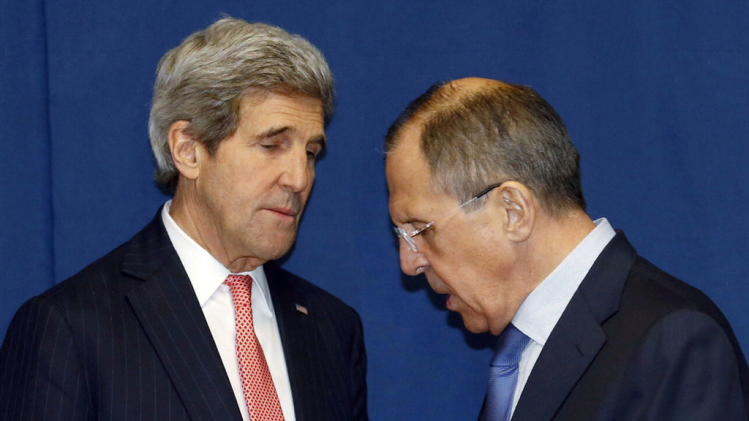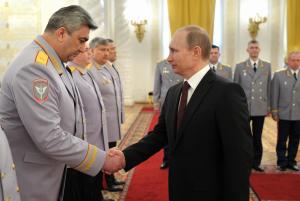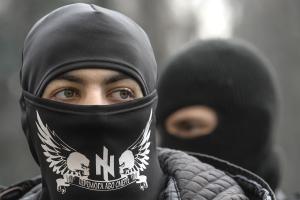Kerry, Lavrov seek deal on Ukraine crisis
The latest bid to resolve the worst East-West standoff in the post-Cold War era comes after Russian leader Vladimir Putin called US President Barack Obama on Friday to discuss a diplomatic resolution.The two men met in the lavish residence of the Russian ambassador to France seeking to hammer out a plan to end the crisis sparked when Moscow sent troops into Ukraine's Black Sea peninsula after the pro-Kremlin regime in Kiev fell in February.
Despite a massive troop build-up on Ukraine's borders, Lavrov has insisted Moscow had "absolutely no intention and no interests in crossing the Ukrainian border".
But he called on Western powers Sunday to back a proposal for Ukraine's Russian-speaking regions to have greater powers in a "federal" and neutral Ukraine.
"If our Western partners are ready, then Russia, the United States and the European Union could form a support group on Ukraine," Lavrov told Russian state television.
This would lead to talks between "all Ukrainian political forces without exception, naturally excluding armed radicals," and would end in a new constitution allowing for a "federal structure" with greater regional autonomy, he said.
Moscow's plan would allow parts of Ukraine to declare Russian as a second official language and secure more independence from Kiev -- a move analysts view as a bid to weaken the authority of what is likely to be a permanent new pro-Western leadership.
However the Ukrainian foreign ministry called on Moscow to stop preaching to its western neighbour.
"We would like to urge Russia, before it presses its ultimatums on a sovereign and independent nation, to take note of the catastrophic state and complete powerlessness of its own ethnic minorities, including Ukrainians," it said in a statement.
- 'No single plan' -
A plan outlining how the situation could be resolved has gone through a number of modifications, with a Russian diplomatic source telling AFP that the two men were first to meet alone and then broaden their talks to include their advisors.
Russian Deputy Foreign Minister Sergei Ryabkov insisted Saturday to the state-run RIA Novosti agency that "it is the United States that is responding to our proposals on Ukraine."
"We have differing views of the situation. Our discussions involve an exchange of ideas, but one cannot say that we have some sort of single approach."
Washington says Moscow put forward a plan on March 10 that has been substantially modified since, and on Monday in The Hague Kerry went "through each point that was made in the Russian proposal with ideas on how to proceed," the State Department official said.
The ideas "include the need for de-escalation, the disarmament of" pro-Kremlin militias in Ukraine and the need for international monitors.
They also include calls for direct dialogue between Russia and Ukraine, constitutional reform and the upcoming Ukrainian elections on May 25.
At the heart of the US initiative is a commitment by Russia to halt its military buildup near its ex-Soviet neighbour --- estimated by US and EU diplomats to have reached between 30,000 and 40,000 soldiers in recent days -- and to order its Crimean forces back to their bases.
- More autonomy -
Moscow has however so far rejected direct talks with the new, interim Kiev leaders under the auspices of either Washington or some international contact group.
Lavrov told Russian state television on Sunday that Kiev appears to be opposed to Moscow's solution.
Ukraine's interim Foreign Minister Andriy Deshchytsya "said that our proposals are unacceptable because federalism contradicts the basic principles of his state," Lavrov said after they met for the first time last week in The Hague.
Russia further wants the constitution to proclaim Ukraine a neutral country that will never join forces with NATO -- membership which Kiev's interim leaders say they are not seeking now.
Meanwhile boxer turned opposition leader dropped Vitali Klitschko dropped out of the Ukrainian presidential elections and threw his weight behind business baron Petro Poroshenko.
The
charismatic tycoon -- known at home as the "chocolate king" because of
his vast Roshen sweets empire -- has a healthy lead in polls over former
premier and 2004 pro-democracy Orange Revolution co-leader Yulia
Tymoshenko.




No comments:
Post a Comment